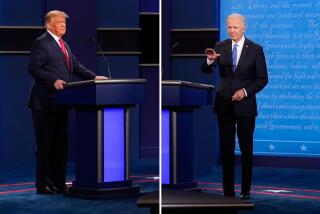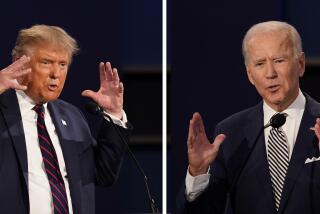Networks Reach Deal to Share War Video Feeds
- Share via
NEW YORK — The major U.S. television networks, aiming to lessen any competitive pressure that might affect the safety of their staffers in Baghdad, struck a deal Monday to share any video feeds they manage to get on the air in the first 24 hours of the expected war with Iraq.
ABC, CBS, CNN, Fox News Channel and NBC agreed to the video sharing even as both NBC and ABC pulled their personnel out of Baghdad for safety reasons, in anticipation of the start of U.S.-led attacks. CBS and CNN said they still had employees in the city but were evaluating the situation by the hour. Fox’s employees were expelled from the country last month after the U.S. government kicked out a reporter from the Iraqi News Agency living in New York City.
For the record:
12:00 a.m. March 19, 2003 For The Record
Los Angeles Times Wednesday March 19, 2003 Home Edition Main News Part A Page 2 National Desk 1 inches; 31 words Type of Material: Correction
Correspondent’s name -- In an article in Tuesday’s Section A about news media pulling journalists out of Baghdad, L.A. Times Cairo Bureau chief Michael Slackman’s last name was misspelled as Flackman.
Print media also began reacting to the increased likelihood of hostilities. The Associated Press said its reporters were still in Baghdad but that the situation was being evaluated daily.
Chicago Tribune reporter Ernie Torriero on Monday was “asked to get out of there for his own safety,” said deputy foreign editor Mike Jett, partly because of the news that NBC staffers, along with all United Nations personnel, were leaving.
The Los Angeles Times has two correspondents in Baghdad, Moscow bureau chief John Daniszewski and Cairo bureau chief Michael Flackman, as well as photographer Carolyn Cole. Also working with The Times in Baghdad is Sergei Loiko.
“Our correspondents want to stay very much. They feel the Iraqis don’t have a choice to leave, so they want to stay,” said The Times’ foreign editor, Marjorie Miller. “We’re trying to determine whether they can do that relatively safely given that there will be a war. We’re reevaluating the situation hour by hour.”
New York Times Managing Editor Gerald Boyd declined to say whether that paper’s reporters would remain in Baghdad, saying, “We are not ready to discuss that subject yet.”
The network agreement to pool any pictures at the beginning of hostilities is similar to an agreement struck in the aftermath of the Sept. 11 terrorist attacks. It stemmed from conversations begun last week over security issues, and “out of that grew the desire, at least for a time, to quell the competitive juices and have safety be the most important thing,” said John Stack, vice president of news-gathering at Fox News.
Qatar’s Al Jazeera network, widely expected to be able to provide pictures from inside Iraq, has sharing deals with all the networks already. Monday’s agreement, however, doesn’t cover any pictures individual networks might get via other arrangements they have with organizations such as Britain’s BBC and Sky News.
It is undecided whether it will apply to any video supplied by Peter Arnett, who is in Baghdad working for National Geographic Television, and whose reports air on NBC and its MSNBC news channel. National Geographic said current plans are for Arnett and his crew to stay but the situation is being reassessed regularly. Arnett is known for his live reporting from Baghdad as part of CNN’s team during the 1991 Gulf War.
CNN correspondent Nic Robertson and producer Ingrid Formanek also were in Baghdad for CNN in 1991 and are in the city now, along with two others. CBS correspondent Lara Logan, a South African, also remains, along with a crew.
All Western TV news organizations are required to broadcast from the Ministry of Information building in central Baghdad. NBC asked Iraq for permission to broadcast from other locations, since the ministry is widely expected to be a target of U.S. bombs. When permission was denied, NBC’s six staffers left.
“We expect that they were going to be exposed to some very real dangers,” a spokeswoman said.
ABC pulled its correspondent and producer out at 1:30 a.m. Pacific Standard Time on Monday, concluding that “there was an unacceptable level of risk,” a spokesman said.
More to Read
The biggest entertainment stories
Get our big stories about Hollywood, film, television, music, arts, culture and more right in your inbox as soon as they publish.
You may occasionally receive promotional content from the Los Angeles Times.










